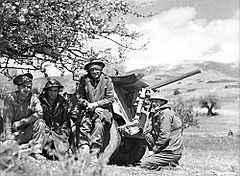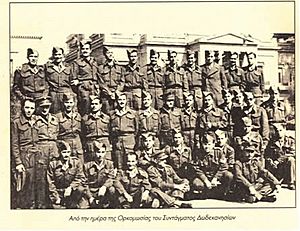Battle of Vevi (1941) facts for kids
Quick facts for kids Battle of Vevi |
|||||||
|---|---|---|---|---|---|---|---|
| Part of World War II | |||||||
 Members of the Australian 2/1st Anti-Tank Regiment resting, soon after their withdrawal from the Vevi area. |
|||||||
|
|||||||
| Belligerents | |||||||
| Commanders and leaders | |||||||
| Strength | |||||||
| eight infantry battalions; elements of one machine gun battalion and several artillery batteries | one mechanised brigade (Waffen SS); one armoured brigade (German Army) | ||||||
| Casualties and losses | |||||||
| British Empire 56 killed (28 Australians, about 27 British, 1–2 NZ ) 480 captured Greece: 40 killed/wounded 136 captured |
37 killed 98 wounded 2 captured |
||||||
The Battle of Vevi (also known as the Battle of the Klidi Pass) was an important fight during the Battle of Greece in World War II. It happened on April 11–12, 1941, near the town of Vevi in northern Greece. In this battle, soldiers from Allied countries fought against forces from Nazi Germany.
Contents
The Battle of Vevi
Why the Battle Happened
In early April 1941, German forces invaded Greece and southern Yugoslavia from Bulgaria. After Yugoslavia's defenses collapsed, the Greek and British Empire forces in Greece found their side open to attack.
A new plan was made: British Empire forces would try to stop the Germans in western Macedonia. This would give Greek foot soldiers time to move to a new strong defensive line between Mount Olympus and the Aliakmon River.
On April 10, German tanks and soldiers moved quickly from Monastir to take the Greek city of Florina. A special German unit, the Leibstandarte SS Adolf Hitler (LSSAH), led by Josef Dietrich, pushed further south and captured Vevi on April 11.
Who Fought at Vevi?
A mixed group of soldiers from Australia, Britain, New Zealand, and Greece was quickly put together. This group was called Mackay Force, named after its commander, Australian Major General Iven Giffard Mackay. Their mission was to stop the fast German attack (a "blitzkrieg") coming down the Florina Valley.
The battle took place at the Klidi Pass, a narrow, winding valley about 100 to 500 meters wide, with steep, rocky sides. The weather was very cold, with rain turning into snowstorms, which made it hard for the soldiers, especially those from warmer climates like Australia and New Zealand.
Allied Forces
Mackay Force was split into two main areas. Greek forces were positioned around the town of Kelli, while British Empire forces defended the Klidi Pass itself.
The British Empire units at the pass were mainly from the Australian 19th Infantry Brigade, including the 2/4th and 2/8th Battalions. They were joined by the British 9th Battalion, King's Royal Rifle Corps. These soldiers were supported by New Zealand machine gunners and Australian and British artillery units.
The Greek forces in the Kelli area included the Dodecanese Regiment (about 3,500 soldiers) and other Greek border units, totaling around 5,000 soldiers and 15 guns.
German Forces
The German forces attacking the Klidi Pass were from the 9th Panzer Division and the LSSAH unit. These included fast-moving reconnaissance units, infantry battalions, and powerful artillery.
The Germans also used special vehicles called Sturmgeschütz III (StuG III) assault guns and Pz.Jg. I tank destroyers. These were like small tanks with powerful guns, and they were very effective in the battle.
The Battle Begins
On the night of April 10–11, German patrols tried to test the Greek defenses but were pushed back. On April 11, the German Waffen-SS units began to attack the British Empire positions. They even sent trucks close to Australian artillery, which were quickly fired upon. More serious fights happened against the Australian 2/8th Battalion as night fell. Despite being tired and cold, the Australians held their ground.
By the morning of April 12, there was over 30 centimeters of fresh snow. Many Australian and New Zealand soldiers were suffering from frostbite, making it hard to use their weapons. However, orders had been given for a planned retreat to a new defensive line that evening.
The Main Attack
At 8:30 AM on April 12, the main German attack began. Without much warning, German soldiers from LSSAH attacked a key hill (Hill 997) held by the Australian 2/8th Battalion. After fierce fighting, the Germans captured the hill by 11:00 AM.
Around the same time, the British 1st Rangers unit began to retreat, possibly thinking the Australians were also pulling back. This created a gap in the Allied lines and left Australian anti-tank guns unprotected.
Despite this, at 2:00 PM, the commander of the 2/8th Battalion, Lieutenant Colonel John Wesley Mitchell, ordered a counter-attack. They managed to regain some important ground. However, the Rangers had moved back, leaving the 2/8th Battalion exposed.
As the afternoon went on, German artillery fire on the Greek lines became very intense. At 3:40 PM, General Mackay ordered the Greek Dodecanese Regiment to retreat immediately.
At 5:30 PM, about 500 German infantry soldiers, supported by their powerful self-propelled guns, launched a strong attack across the entire front of the 2/8th Battalion. These self-propelled guns were surprisingly good at climbing the rocky slopes. The Australian 2/8th Battalion was forced into a difficult retreat. Many soldiers had to abandon their weapons to move faster. The Australian 2/1st Anti-Tank Regiment and British Royal Horse Artillery bravely stayed behind to cover the retreat, firing until the Germans were very close.
By 6:00 PM, German forces had captured the village of Klidi and taken many prisoners. They also reached Kelli and other areas, taking more prisoners from New Zealand, Britain, and Australia.
Retreat and Aftermath
The early collapse of the British Empire's lines allowed German forces to advance quickly. This meant the Greek Dodecanese Regiment, which was trying to retreat, was attacked by German "tanks" (actually the StuG and PzJg I vehicles). British tanks arrived just in time to save the Greek soldiers from being captured.
In the west, the Greek 88th Regiment was also attacked and overwhelmed. They suffered many casualties and had to retreat.
By 9:00 PM, German operations stopped for the night, having pushed the Allied forces back significantly.
The 2/8th Battalion was severely damaged as a fighting force after this battle. Many soldiers were captured or lost their weapons. The Germans claimed to have taken 480 "English" prisoners, while losing 37 killed and 95 wounded.
Even though Mackay Force was defeated and suffered heavy losses, their actions at Vevi bought two crucial days for the other Allied forces to retreat and regroup further south. This delay was very important for the overall Allied defense in Greece, allowing other Greek divisions to try and reach new defensive positions, though they were still in a tough spot.
More to Explore
- Operation Marita (The German plan for invading Greece.)
- Battle of Kleisoura Pass, the next major battle after Vevi.
 | Sharif Bey |
 | Hale Woodruff |
 | Richmond Barthé |
 | Purvis Young |


